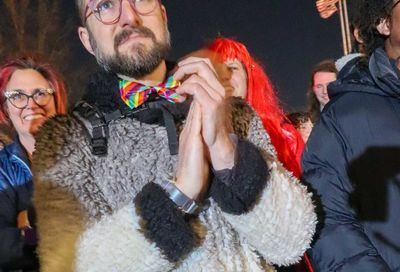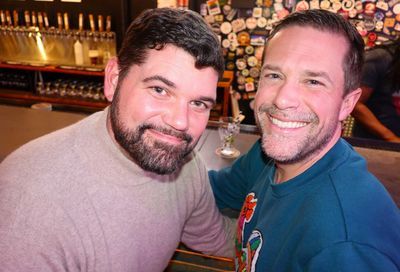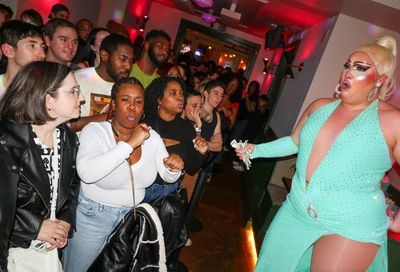Brian Sims has dedicated his life to achieving equality — and he won’t stop until it happens
The gay Pennsylvania state rep. is passionate, outspoken, and unwilling to censor himself

Whatever other criticisms people may direct his way, Brian Sims is no shrinking violet. The outspoken Pennsylvania state representative from the City of Brotherly Love is assured of his opinions when it comes to the political and social issues of the day.
“I’m very comfortable and confident in both the morality of my ideology, but also in the breadth of it,” he says. “And I know that a majority of Americans agree with me, a majority of my constituents agree with me, and I believe a majority of my colleagues do.”
Sims became the first openly gay legislator elected to the Pennsylvania House of Representatives in 2012, and is currently one of two out LGBTQ legislators in the body. Upon his first election, the historic nature of his win — assisted by his football player build, neatly trimmed beard, and piercing blue eyes — instantly propelled him to celebrity status. It also gave the freshman Democrat a national platform that would not be afforded to most other state representatives, regardless of the length of their service.
It’s a platform that the 41-year-old is mindful to use for moral causes: promoting social justice, advocating for equality for historically disenfranchised groups, and asking others to use their relative privilege to donate, volunteer, or vote.
“There was a Latinx out gay man who ran for city council in Philadelphia last year,” says Sims. “He used to often say, ‘Don’t give a voice to the voiceless. Give them a microphone.’ I value that immensely.”
Sims is also not content to stand on decorum or censor himself for the sake of “civility,” if it means compromising principles. If he believes something ardently, he’ll voice his sentiments. Take a viral photo last year of Sims sticking up his middle finger to “welcome” Vice President Mike Pence to Philadelphia for a political fundraiser. Sims was criticized by some, but his message to Pence — and the Trump administration overall — was clear. “We’re a City of soaring diversity,” he wrote in a Facebook post accompanying the photo. “We believe in the power of all people to live and to contribute: Black, Brown, Queer, Trans, Atheist, Immigrant, we want you and we’ll respect you.”
Sims has directed his harshest criticisms at Republican leaders in Harrisburg — whom he sees as illegitimate, given the gerrymandered nature of Pennsylvania’s legislative districts — for pushing bills to restrict abortion, hinder police accountability, and end assistance programs for needy residents, and for killing progressive legislation calling for LGBTQ equality, a higher minimum wage, environmental protections, and gun reform measures.
A self-described “Army brat” raised by two lieutenant colonels, Sims moved around a lot as a child before his parents retired in Southeast Pennsylvania. The experience instilled a love of adventure in Sims, who was never shy to embrace new experiences.

After graduating from Bloomsburg University — where he was an all-conference defensive lineman for the football team — Sims pursued a law degree at the Michigan State University College of Law. Following graduation, he worked as counsel for the Philadelphia Bar Association, a senior law clerk for the Environmental Protection Agency, and as a civil rights attorney. During that time, he also served as president of the board of directors of Equality Pennsylvania and chair of GALLOP, the Gay and Lesbian Lawyers of Philadelphia.
Appropriately enough, one of Sims’ heroes is Benjamin Franklin, the quintessential Philadelphian, whose First District in the Pennsylvania Assembly overlaps Sims’ current House district. He’s such a Franklin fan that he even has a tattoo of one of the Founding Father’s quotes on his arm.
“When I was a little kid, I had a lawn mowing service. And my parents had told me that I needed to have a business card. My mom helped me take a brown paper bag and cut it up into little business card sized pieces of paper. On one side I put my name, my parent’s address, and their telephone number. And on the other side, they told me I needed to put the name of my business or a quote.
“We had an Encyclopedia Britannica at the time, and I pulled it out, dug through, and found this great Ben Franklin quote. ‘Be civil to all, sociable to many, familiar with few, friend to one, enemy to none.’ That quote has followed me my entire life. It wasn’t until after I got sworn in that our house parliamentarian came up and told me, ‘You know, you’re in the old Franklin seat.’ It was one of those complete kismet, full-circle moments of my life.”

Unapologetically liberal, Sims says his fellow Democratic party members would do well to embrace and stand firm on progressive principles.
“I don’t think we serve ourselves well as Democrats by watering down the best of our ideologies. We should always be staunchly pro-choice. We should always be staunchly pro-equality. We should always recognize the power, the influence of immigrants. Those are things that I don’t think that we should ever be quiet on, that we should ever back off on. Frankly, the Democratic party is the only party that’s ever occupied the White House and balanced the budget. We should be loud and proud about those things.”
He also bemoans the fact that legislatures often don’t look like the constituents they represent, and wants to encourage other ordinary people to run for office if they seek to change things, as he did.
“I’m a civil rights attorney that got mad at my government and got mad at the people who were making bad decisions and ran for office,” he says. “Being an elected official was not the fulfillment of a lifelong dream for me.
“I tried for a couple of cycles to elect an out person to our legislature, and it just wasn’t happening, and my friend sat me down and said, ‘Maybe you’re the person.’ And it’s not that they had to convince me. It’s that I thought, ‘All right. Can I do this better? I think I can.'”
METRO WEEKLY: Let’s start with your upbringing.
BRIAN SIMS: I come from a military family. My siblings and I are all Army brats, as are my parents. My mom and dad met during the Vietnam War. My mom enlisted and my dad was drafted. Both served in the Army. And after getting married right after the war, stayed active duty military for the remainder of my young life. I have an older brother, a twin brother, and a younger sister. And my family, as all Army families or military families do, moved around quite a bit. I was born in Washington, D.C. at Walter Reed, but moved states about every two or three years until I got to high school. I lived in places like Kansas and Alaska. I lived at West Point, New York, the Military Academy, a little bit of everywhere, and really loved it.
I ended up going to Bloomsburg University, which is a state school, in the northeastern part of Pennsylvania, up in the Poconos. I went there to play football, and it was one of the best experiences of my life. I was the captain of the team my senior year. That was the year that I came out of the closet.
I got the benefit of both having a really strong family and really strong friends when it came to my coming out. I didn’t have to turn to the other because I lost one or the other. My family was very supportive of me and my team was very supportive of me when I came out.

MW: You came out in college, but when did you first know that you were gay?
SIMS: I knew that I wasn’t straight long before I knew that I was gay. And I know that sounds like splitting hairs to some people, but I think it was clear to me in measuring the differences between how I was interacting with girls when I was a young teenager and how my friends, my male counterparts, my brother, how they were interacting with girls. Anybody who knows me will tell you that I have a beyond healthy respect for women. I’m just not sexually attracted to women.
I don’t know when I actually finally figured out that that meant I was gay. I was probably 16 or 17 when it occurred to me that I definitely wasn’t straight or bisexual; that I was a gay man. It would be another four years before I came out of the closet, but I didn’t have one of those experiences, I’m very proud to say — or lucky to say — that I didn’t have a really haunting closeted experience.
Football was a huge part of my life, as were academics, and I was able to bury myself in those things, which is something I hear from a lot of people about their lives before they came out of the closet. And it was true for me.
I don’t remember having years where I hated myself or I hated my sexuality. I remember being very confused about it at times, but I don’t ever remember any moments of self-hatred, or self-loathing, or really being fearful in the closet.
MW: After college you went to law school. Was that always the plan?
SIMS: When I was 21 years old, I got accepted to law school. My parents sent me a plaque, and on it is this quote by Lyndon Johnson on the scales of justice. It’s this quote about law giving man mastery over himself. The quote itself is good, but not all that particularly interesting. What was so interesting for me was on the back of it was a note my parents wrote for me when I was in my early teens, about knowing that I wanted to become a lawyer.
When I was a little kid, when I was 10, 11, and 12, if you asked me what I wanted to be when I grew up, I was going to tell you I was going to be a feminist lawyer. That was my line. As a little kid, I remember distinctly. And my friends like to razz me about this because it’s something they remember as well. I used to tell people I was going to be a feminist lawyer. As I got older, I knew that that meant women’s and reproductive rights, but for most of my teens, that’s just what I thought I was going to be for a couple of different reasons. And as I look back on those reasons now, I don’t know if they were as solid in my mind as they are now, but I grew up in a household that had one of the highest-ranking women officers on any base that I was ever living in. That was my mom.
Most of my friends, their fathers were soldiers or officers, and their moms were homemakers or maybe teachers. I consider my parents relatively alpha people. They went on to become lieutenant colonels. But never, ever do I remember my parents treating each other or treating anybody else differently because of their gender. Nor do I ever remember the power dynamics of male and female power differences in this patriarchal world ever seeping into my own household. And so, it was around my early teens when I started really seeing how differently the girls in my class were treated, how differently women in general were treated, how my friend’s moms were treated differently.
So, I knew what I wanted to do. All through high school and college, everybody that I interacted with knew what I was going to do with myself. I took my LSATs I think the first time when I was 16 years old. So when I went off to law school, it was much more of a fulfillment of a lifelong dream than, say, getting elected to office was.

MW: Are you in a relationship right now?
SIMS: I got out of a long-term relationship about a year ago, and now I’m dating.
MW: Are there any other relationships in your life that are particularly meaningful to you?
SIMS: Yeah. I have a group of three women that I’m extremely close with. A lesbian woman who is the former LGBTQ liaison to Philadelphia and a trans woman who is the highest LGBTQ vote-getter in Philadelphia history. She ran for City Council last year, and although she didn’t win, she is perhaps one of the most notable LGBTQ activists in my city. The third is a straight cis woman who lives in the suburbs outside of Philadelphia, who was one of the lead organizers of the Women’s March on Philly.
What’s so unique about them is, in my life and in their lives, we all interact with people just like us all the time. I interact with advocates and activists, and they interact with elected officials, and we all interact with organizers. But the four of us have formed this very tight-knit group. There’s not a day that goes by that we’re not talking about each other’s jobs, talking about each other’s interactions, professionally and personally. And I have found it to be a group of advisors in my life that have had a tremendously positive impact on me.
MW: Is there anyone in politics that you’re close with? Or is it different in Harrisburg because people have sharp elbows?
SIMS: I’d say it’s a lot like it is in almost all workplaces. People will find themselves in a particular business unit, where they kind of have to get along with all their co-workers, but within that group there’ll be people they like more, and people they like less, and they’ll probably have a couple of close work friends, and they’ll probably develop a friend or two out of that group that is more than a work friend. And that’s been the case for me. I have a couple of colleagues that I consider authentic, true friends that I will have long beyond my time in office. I have a whole bunch of colleagues that we’re cordial because we work together and we have common goals, and then of course I have colleagues I don’t get along with.
What’s different about my workplace is that us not getting along often has to do exactly with the issues that we’re talking about at work. While there are certainly personality differences, I also work with people who think that I should be a second-class citizen or that I don’t deserve civil rights. And so, it’s one thing to not like the food that somebody is microwaving at lunch, or not like how often they’re stepping out for a smoke break and leaving the door open. It’s another to work alongside somebody who is actively trying to promote discrimination towards you.
MW: You’ve infamously clashed with Rep. Daryl Metcalfe.
SIMS: Yeah. Chairman Daryl Metcalfe. He is without a doubt, in my now-going on eight years in office, the most racist, sexist, homophobic, transphobic, xenophobic bigot that has served in government in Pennsylvania. And I don’t say those things lightly.
When I joined the legislature, I knew who he was, although everything I say about him is based on my personal experiences with him. I knew who he was at the time, and I knew that he was all of those things, but I was uncomfortable using those words, in part because I was afraid about how it would reflect on the General Assembly, how it would reflect on me as a legislator.
But I don’t ever want to let decorum get in the way of substance. And I think people like him, bigots like him, get a pass because of decorum. And I think he counts on getting that pass to get his message across, and I don’t want to be one of those people that buys into that. The word “racist” has definitions, and I think he’s a racist because of his public statements and the legislation that he’s put forward. Being a xenophobic bigot isn’t subjective. I think it is based on who he is and what he has said and done, and I think those things are important to talk about.
MW: Pennsylvania House lawmakers were brought up by Democratic and Republican leaders, saying “We need to be more civil,” and using you and Rep. Borowicz and Rep. Ellis as examples of bad behavior. Do you ever worry about offending people so much that they can’t work with you?
SIMS: Of course I do. Yes. And I wouldn’t be doing my job if I didn’t. It’s one thing to be politically minded. It’s one thing to have strong values and to know how to use your voice. All of those things are great. And I work with activists and advocates like that every day. I’m also a legislator. I have a job. I have a duty to move forward these things that we share values about. While I think it’s really important that people who have values loudly share them if they can do so with respect, I think it’s equally important that we don’t pretend that these things are two sides of the same coin.
Stephanie Borowicz standing up in front of the first African-American Muslim woman being sworn into the house in front of her imam and talking about how there’s only one true God in front of her, that’s very different than me standing up and saying, “Enough of the hypocrisy. Enough denying people equality.” I want to make sure that I push back against this sentiment that we’re just talking about: “It’s the same kind of rationale, just on the left, as some on the right.” That’s not what’s going on here.
Conservative members of my legislature have gerrymandered the legislature more than any in America. It’s illegal, and it’s unconstitutional, and it hasn’t stopped yet. And it will soon, as evidenced by the [redistricting] ruling from our federal courts. But until then, they’re trying to do everything they can to undermine equality. Equality of opportunity, equality for LGBTQ people, equality for African-American people, equality for women, equality for immigrants, equality for all people. That’s a far cry from loudly demanding equality for all people.

MW: Some people have criticized you for being more show horse than workhorse. How do you feel when you hear those criticisms directed towards you?
SIMS: First of all, I’ve introduced 17 major pieces of legislation. I serve on four separate committees in the state house. I also serve on the policy committee. I’m the chair of the LGBT Caucus. I’m the co-chair of the State System of Higher Education Caucus, and I hold a town hall roughly every 45 days or so. I’m a workhorse. As for a show horse, I don’t know what that means. What I do know is that my colleagues view power in three different ways: the ability to get votes, which we can only do every couple of years; the ability to raise money, which most of us only have to do every couple of years; and the ability to get your message heard. And I have a disproportionate ability to get my messages heard.
I have a platform unlike any other state legislator in the country. And it was a part of this platform that I brought to the campaign trail and said, “This is among the things that I can offer. I’m not just going to sit here and be a freshman, sophomore, or junior member that sits in my office or sits in the Capitol and hopes for change. I’m going to do everything with the power I have to make that change.” I have a very unique ability to draw attention to issues. And as someone who is in the minority party in a gerrymandered state, from the least-liked city in my state by Republicans, having this platform is an antidote to their unethical, immoral, and — I believe — unconstitutional control of my legislature.
MW: You were involved in a recent controversy where you filmed a video of yourself confronting protesters outside a Planned Parenthood Clinic, leading to a backlash from pro-life groups. Republicans brought a censure resolution against you, although they have since withdrawn it. Did you learn anything from that incident?
SIMS: I’ve lived across from that Planned Parenthood almost my entire time in Philadelphia, and it is perhaps the most heavily protested Planned Parenthood in America. It was the Planned Parenthood that took a U.S. Supreme Court case that decided the trimester system back in the ’80s. It is what I consider to be one of the most racist corners in my district. And what I mean by that is, on any given day, you can go there and you’ll see a couple of people lined up, or just one person, making sure that every person of color that goes in and out of that Planned Parenthood for health care hears about why it’s shameful, or hears a bible verse yelled at them, or gets handed a small, black plastic fetus that they hand out there.
The horrendousness of it is something that will impact the rest of my life. I will never unsee or unknow the things that I saw living next to that Planned Parenthood. As a patient escort there for seven years, I had to stand there and really see it all firsthand. But I am also extremely well-trained in why not to interact with them in the way that I did. I had watched them harass two young girls of color, I had walked away, and I got very mad at myself for doing it.
I spend so much of my day and my time and my life trying to ask people who have privileges that I don’t have to do something with that privilege. We’re always asking men to be better allies to women and actually defend women. And what I thought I was doing was using my white privilege, my male privilege, to voice up and defend people who were not being defended at the time. And I know better now.
There are hundreds of better ways to use that energy, that ideology, and while I do believe that bullies need to be pushed back against, and that’s not going to change — and while I do believe that driving into inner city Planned Parenthoods so that you can harass young girls who are seeking health care, young girls of color especially, is heinous and wicked — I also know that sometimes when you’re a fighter, everything looks like a fight, and that’s not the case. And in this case, I was wrong.

MW: You did apologize, not only to the protesters, but to Planned Parenthood because it prompted anti-abortion protesters to hold a rally outside the clinic.
SIMS: Absolutely. Planned Parenthood is perhaps the organization, other than The Victory Fund in this country, that I most closely align myself with. I feel like I know virtually every single person that works at that Planned Parenthood. I certainly know every volunteer that had to show up that day and put on a yellow jacket and stand out there and protect patients that were coming and going because of something that I did. I know them very well, and I am very, very sorry to them for how this played out. And it was something I should’ve foreseen and would never do again.
MW: Were you ever worried about having a civil suit brought against you?
SIMS: No. I’m a lawyer, and I know better.
MW: You’ve spoken before about having received death threats or having people call you a fag. Does your sexual orientation still rankle the average person in the way that it did when you were first elected?
SIMS: A little bit more. Actually, I’m not going to lie. Not a little bit more — a lot more.
MW: Why do you think that is, especially since you’ve been around for a while?
SIMS: I think that’s the reason why. It didn’t make me go away when I started. Seven years ago, getting my first round of death threats at my office was scary. It was scary for my staff, it was scary for my family, and I moved, and I moved offices. And as it continued to happen, I learned more about it. The police around me learned more. My staff learned more. And I learned how to approach it. Here I am, now in my fourth term in office, running for a fifth term, and I think that there are more people with whom my messages are resonating. And I think there’s more people realizing that I’m not somebody that gets bullied or that takes well to it.
I’m here to do a job, and one of the side effects of having to do this job in this era, in this time period, is that I have to do deal with an inordinate amount of hate. You probably don’t know anybody that gets called a faggot as much as I do. You probably don’t know anybody, and you’ve probably not spoken to anybody that actually gets as many death threats as I do. That’s not something I take any pride in whatsoever, but I will tell you that it’s not because I’m sitting on my ass and doing nothing.

MW: Two things that come up when others talk about your personality is that you get very excited and passionate about what you’re dealing with or talking about, and the other is something you said back when you first ran for the legislature, which is you have “a mouth like a truck driver.”
SIMS: By the way, I used to say that all the time, but when you say it to a gay crowd, it always sounds different. [Laughs.]
MW: That definitely has a different connotation. On that point, though, have either of those traits been a help or a hindrance to you?
SIMS: Maybe they’re a hindrance. There’s no question that there are certain audiences that I’m in front of that hear me say “Oh, fuck” who don’t want to hear that. But by and large, I’ll tell you why I think it’s helpful. Maybe I should spend more time thinking about this and have a better answer, but I don’t think there’s anybody who walks away from meeting me, or hearing me speak in front of an audience, who doesn’t think, “That guy believes in the things that he’s doing. He cares deeply about making sure that those things happen in this world, and I’m a lot more like him than I would think that I am.”
Yeah, I curse sometimes, but you know what? Most people curse sometimes. I’ll tell a crowd: “I want you all to run for office,” or, “Look around, and if it’s not you, you know somebody that should.” I can’t tell you the number of people who will come up to me afterward and say, “I really would love to run for office,” or, “My friend really should run for office,” except that they aren’t a lawyer, or they dropped out of college, or they’re a single mother, or they have a history of addiction, or they’re in recovery.
All of these things that somehow people think are negatives, I know, both in real life and statistically, make people more relatable. Nobody reads a list of your accomplishments and thinks, “I’m just like that person.” They do feel that when they hear about your struggles, your foibles, the things that you’ve had to overcome.
I talk a mile a minute. I’ve got kind of a foul mouth sometimes. But I don’t think anybody thinks I’m anything other than who I say I am — and if nothing else, that’s a bit refreshing in politics these days.
Follow Brian Sims on Twitter and Instagram. Learn more at www.sims4pa.com.
Support Metro Weekly’s Journalism
These are challenging times for news organizations. And yet it’s crucial we stay active and provide vital resources and information to both our local readers and the world. So won’t you please take a moment and consider supporting Metro Weekly with a membership? For as little as $5 a month, you can help ensure Metro Weekly magazine and MetroWeekly.com remain free, viable resources as we provide the best, most diverse, culturally-resonant LGBTQ coverage in both the D.C. region and around the world. Memberships come with exclusive perks and discounts, your own personal digital delivery of each week’s magazine (and an archive), access to our Member's Lounge when it launches this fall, and exclusive members-only items like Metro Weekly Membership Mugs and Tote Bags! Check out all our membership levels here and please join us today!




























You must be logged in to post a comment.